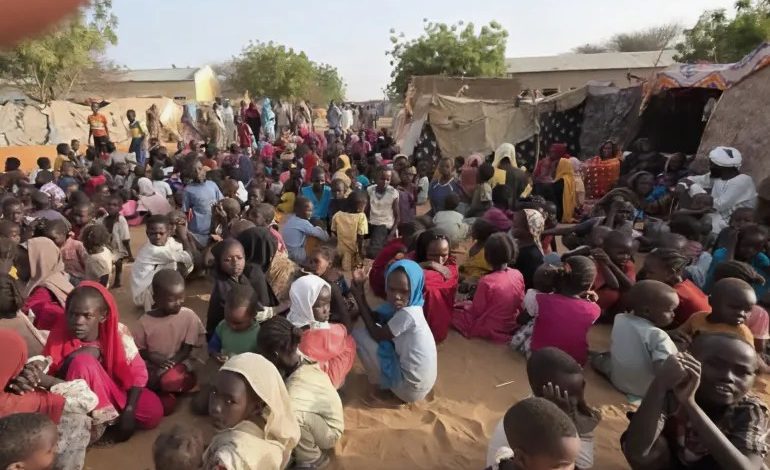Al-Fashir Soup Kitchens Struggle to Survive Amid Rapid Support Forces Siege and Violations

Sudan Events – Agencies
While the sounds of shelling and gunfire echo throughout the city of Al-Fashir in western Sudan, another sound rises—one of hope amid the noise of war. Children’s laughter blends with it as they gather at a shelter, waiting for a meal from a food-preparation kitchen, a scene that reflects the resilience of the city’s residents despite the destruction and hunger surrounding them.
As children filled the yard of the shelter, hearts full of hope and longing for the promised meal, fear hung over the city, which has become a battlefield of suffering in Darfur. The constant gunfire in the background serves as a stark reminder that sorrow and anxiety still haunt the residents at every moment.
Umm Kulthum, a mother of three, told Al Jazeera Net: “We have waited for this moment for so long. Food is not just a need; it’s a reminder that someone cares. These smiles on my children’s faces ease the pain.”
She added, “But fear never leaves us. Every explosion makes me feel that death is getting closer. Life has turned into a never-ending nightmare. Every moment, I feel that death could come under the bombing—even as I watch my children eat.”
The First Soup Kitchen
Muhyiddin Shogar, a local volunteer, established the first soup kitchen in Al-Fashir after war broke out in Sudan. Before that, he had been involved in other charitable efforts, including beautifying the city, washing and burying the dead, and rebuilding schools and homes for the poor.
Shogar told Al Jazeera Net, “The goal of these initiatives is to serve the people. We are determined to keep going despite the shelling and siege.” He added that the kitchens rely on donations from generous supporters who, despite limited resources, contribute significantly to providing food supplies.
He affirmed, “We will not stop until we meet our Maker,” stressing that the determination and willpower of the volunteers give them strength to continue their humanitarian mission, despite the challenges.
The soup kitchens in Al-Fashir, managed by volunteers, are engaged in a fierce struggle for survival. They face severe shortages in food supplies and a lack of cash due to the siege imposed by the Rapid Support Forces (RSF).
Mohamed Adam, a member of one of the kitchens, explained: “We are fighting a daily battle to meet the needs of the displaced amid a dire lack of food and water. Despite that, we do everything we can to ease people’s suffering. We are in a survival battle.”
He pointed to the worsening cash crisis, with liquidity down by 50%, making it difficult for volunteers to purchase even basic necessities. “Still, volunteers make tremendous efforts to provide whatever aid they can to ease the suffering of the displaced under these harsh conditions.”
Intense Siege
In recent weeks, several soup kitchens run by volunteers in Al-Fashir were forced to shut down due to the RSF siege, despite being a vital source of aid for residents in the absence of humanitarian assistance from international agencies.
According to volunteer Tamador Al-Tahir, the kitchen where she worked stopped operating due to the lack of essential goods and worsening cash shortages. She expressed deep concern about the siege’s impact on residents’ lives, saying: “The shutdown of the kitchens means many families won’t get the meals they depend on daily, which risks increasing hunger levels among the displaced.”
Tamador, one of the active volunteers, spoke about the impact on the most vulnerable groups—children and women—saying, “Providing food aid isn’t just a humanitarian act; it’s a duty we all share as a community.”
She added, “We won’t give up. We’ll keep working hard, and hope remains alive in our hearts. We believe tomorrow will be better.” She stressed that volunteering in such conditions requires courage and strong will, as it’s not without risks.
Financial and Supply Shortages
Volunteer Adam Abdullah said their kitchen is suffering from a financial deficit due to a lack of donor support. He told Al Jazeera Net that they have no income sources, and while they receive many requests from people in need, they are currently unable to meet them due to the siege, which has worsened the financial shortfall and lack of cash.
Speaking with a voice full of sorrow, Adam said: “We all feel frustrated because we can’t help people at this time. While the pressure on us increases, we find ourselves without the resources to meet people’s needs.”
He noted that many families rely on their kitchen daily. Volunteers are trying to find new ways to gather support by reaching out to locals both inside and outside the city.
Abbas Saeed, a supervisor at a soup kitchen in the Awlad Al-Reef neighborhood of Al-Fashir, admitted the food they prepare isn’t enough for those in need. Due to the siege, they had to change the meal ingredients, eliminating meat and lentils. He told Al Jazeera Net, “We struggle to get the basic ingredients needed to cook meals, as they are either unavailable in the markets or outrageously expensive.”
Since April 2024, the RSF has imposed a siege on Al-Fashir, the capital of North Darfur, after several local armed factions sided with the Sudanese army under the name “Joint Forces,” following a series of atrocities and violations.
Despite the siege, the Sudanese army and the joint forces have managed to repel more than 180 RSF attacks on the city, with civilians remaining resilient since the war broke out.
Source: Al Jazeera Net



